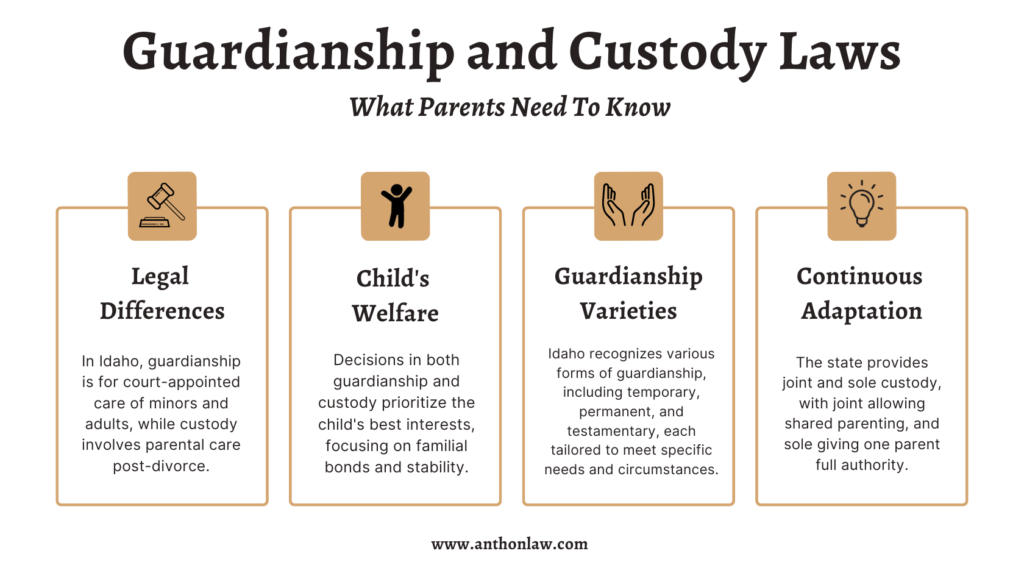Guardianship & Custody Laws
Understanding guardianship and custody is vital for families facing significant transitions. In Idaho, both legal frameworks are designed to protect the best interests of children and incapacitated adults, yet they serve different purposes and come with unique legal obligations.
This article aims to elucidate the distinctions, processes, and considerations pertinent to guardianship and custody in Idaho, offering clarity and direction for those navigating these pivotal decisions.
Legal Guardianship Defined
Legal guardianship in Idaho is the appointment of an individual by the court to oversee the personal care and, in some cases, financial matters of a minor or an incapacitated adult, known as the ward.
This legal mechanism is primarily invoked when parents cannot fulfill their duties due to various incapacities or absences. Guardianship can be classified into several types, including natural, permanent, temporary, general, limited, and testamentary, each tailored to specific needs and durations.
A guardian’s responsibilities might range from making daily care decisions to managing the ward’s finances, depending on the type of guardianship granted. The process involves a formal court proceeding where the potential guardian must demonstrate their capability and the necessity of their appointment for the ward’s well-being.

Custody Laws in Idaho
In Idaho, child custody involves understanding the dual aspects of legal and physical custody, particularly during a divorce or separation. The state’s custody laws ensure that the child’s best interests are always at the forefront of any custody agreement.
Here are the key components of custody in Idaho:
- Legal Custody: This aspect focuses on the rights of a parent to make significant decisions about the child’s health, education, and overall welfare.
- Physical custody pertains to where the child will live and how the parents will divide the time spent with the child.
The court evaluates several factors to determine the most favorable custody arrangement, including but not limited to:
- The desires of the child and the parents regarding custody and living arrangements.
- The quality of the child’s relationship with each parent and any siblings.
- The necessity of maintaining a stable and consistent environment for the child.
Custody agreements in Idaho may be classified as either:
- Joint Custody: Both parents share decision-making responsibilities and physical custody of the child.
- Sole Custody: One parent is granted the primary decision-making authority and physical custody, with the other parent typically receiving visitation rights.
Filing for Guardianship and Custody
Filing for guardianship or custody in Idaho involves a series of legal steps, including submitting specific court forms, possibly completing training for guardians, and attending court hearings. For guardianship, this might include petitions for appointment, notices of petition, and affidavits of service, among others.
Custody filings, part of broader divorce or separation proceedings, require detailed parenting plans and, potentially, temporary orders to address immediate custody and support issues while the case is pending.
Appointing a Guardian for Minor Children
When a parent cannot care for their child, the court may appoint a guardian to assume those responsibilities.
Though parents are natural guardians by default, circumstances such as illness or incapacity can necessitate the appointment of an external guardian, with the court taking considerable care to ensure the appointed guardian serves the child’s best interests.

Permanent vs. Temporary Guardianship
Guardianship meaning can differ greatly, depending on the specific needs and circumstances of the ward. While temporary guardianships are designed to meet immediate, short-term requirements, ensuring the ward’s welfare until a permanent solution is in place, permanent guardianships are established for the long haul, providing consistent care through significant life stages. Here are the distinctions between the two:
- Temporary Guardianship: Tailored for short-term scenarios, these arrangements safeguard the ward’s immediate well-being until a more definitive guardianship can be established.
- Permanent Guardianship: Envisioned for enduring stability, this form of guardianship remains in effect until the ward reaches adulthood or experiences a significant life event, such as getting married or being adopted.
Choosing the Right Path
Deciding whether guardianship or custody is the most appropriate legal arrangement requires careful consideration of the specific circumstances and needs of the individuals involved. Factors to consider include the nature of the necessary care, the duration of the needed support, and the legal rights and responsibilities that best serve the child or incapacitated adult’s interests.
At Anthon Law, we guide families through the complexities of guardianship and custody proceedings in Idaho. Our goal is to ensure that each family we work with makes informed, thoughtful decisions that prioritize the well-being and future of their loved ones. With a deep understanding of Idaho’s legal landscape and a commitment to compassionate advocacy, we stand ready to assist you in navigating these challenging waters.
I amhere to offer expert legal advice and support for those facing decisions about guardianship or custody in Idaho. By partnering with me, you can trust that your family’s legal matters will be handled with the utmost care, professionalism, and dedication to achieving outcomes that reflect the best interests of those you hold dear.





